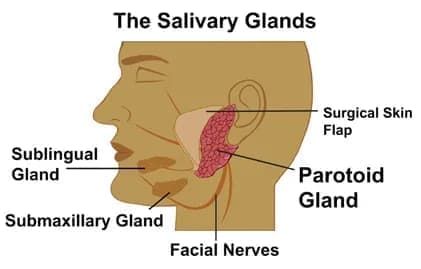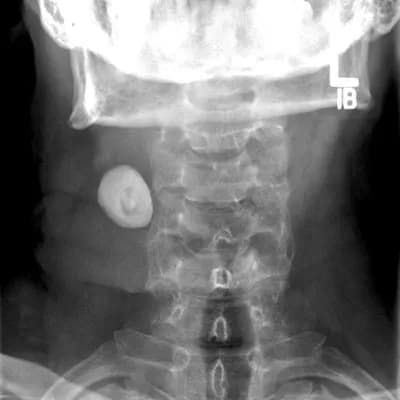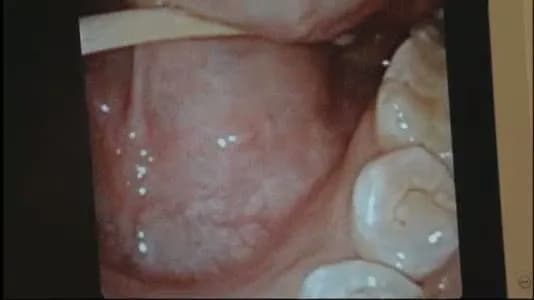What are Salivary Stones?
Formation of salivary stones, a condition medically called Sialolithiasis, occurs when bacterial staph infections, chronic dehydration or excessive amounts of calcium exist in the body that inhibit salivary gland functioning. When saliva becomes abnormally thick, (due to disorders such as Sjogren's syndrome, upper respiratory diseases that irritate or swell nasal passages and ingestion of medications that dry moist oral and nasal tissues) calcification of saliva precipitates within salivary ducts and glands that enlarge and eventually block saliva flow.
Most salivary stones affect glands lying at the bottom of the mouth called the submandibular glands. However, stones can also impair functioning of the parotid glands and the sublingual glands found underneath the tongue.
Symptoms of Salivary Stones
 People suffering from salivary stones may not experience any symptoms until the stones grow large enough to block ducts. When this occurs, saliva released by the gland has nowhere to go and backs up in the gland, causing swelling, pain and sometimes a low grade fever. In addition, any activity that increases salivary production such as eating or smelling something cooking can exacerbate swelling and pain.
People suffering from salivary stones may not experience any symptoms until the stones grow large enough to block ducts. When this occurs, saliva released by the gland has nowhere to go and backs up in the gland, causing swelling, pain and sometimes a low grade fever. In addition, any activity that increases salivary production such as eating or smelling something cooking can exacerbate swelling and pain.
Other symptoms may include:
- Saliva that tastes odd, gritty or bitter
- Severe halitosis caused by dry mouth and infected salivary glands
- Difficulty opening and closing the mouth
If not treated in a timely manner, salivary stone obstruction may lead to a serious bacterial infection that requires intravenous administration of antibiotics and/or surgical drainage of blocked glands. Moreover, conditions conducive to salivary stone formation such as dry mouth, chronic sinusitis and allergies promote the rapid development of anaerobic bacteria. These microorganisms are primarily responsible for halitosis, tooth decay, gum disease and even tonsil stones.
Tonsil stones should not be confused with saliva stones. While tonsil stones and saliva stones resemble each other in composition, tonsil stones form within the fissures of the tonsils and do not generally cause medical issues if left untreated. The main problem produced by tonsil stones is serious halitosis that can be extremely embarrassing to the person suffering from them.
Detection and Removal of Salivary Stones

Side effects may occur when surgery is performed to remove salivary stones. Eventual, extensive scarring of salivary ducts could result in partial or complete failure of the salivary gland to function normally, causing a chronic condition of dry mouth due to lack of sufficient saliva amounts. If the gland affected by saliva stones is the submandibular gland and surgery is needed to remove stones, there is a possibility that two important facial nerves could be injured during the procedure. Damage to the hypoglossal nerve could numb portions of the tongue while damage to the primary facial nerve may induce partial or complete paralysis of the face.
For people who continuously suffer chronic reformations of salivary stones or suffer irreparable damage to one or more salivary glands, physicians will usually recommend removal of the disabled gland to eliminate the potential for serious bacterial infections.
Preventing Formation of Salivary Stones
 Unless someone has a disorder or disease specific to salivary glands, maintaining a sufficient flow of saliva is the best way to prevent the formation of salivary stones. Proper mouth hydration is also vital to preventing tooth decay, gum disease and halitosis, since anaerobic bacteria are directly responsible for these problems. Anaerobic bacteria thrive in dry, airless, stagnant oral conditions by consuming mouth debris, mucus and dead tissue that saliva normally washes away. A chronically dry mouth is highly conducive to anaerobic bacterial growth, which is also a factor contributing to the formation of salivary stones. To keep the mouth sufficiently hydrated, clean-smelling and free of destructive oral bacteria, TheraBreath's powerfully effective line of toothpastes, rinses, gargles, mints and chewing gum provides your mouth with ingredients that naturally promote saliva flow, inhibits saliva stone formation and kills anaerobic bacteria. Bacteriologist, dentist and creator of TheraBreath, Dr. Harold Katz, has included a special ingredient he had patented called OXYD-8. Click here to view a complete line of TheraBreath® products. OXYD-8 is an oxygenating compound that not only stimulates saliva flow but also converts gases comprising bad breath odor into odorless, tasteless molecules that leave your breath fresh and your teeth feeling clean. Additionally, maintaining a consistently moist mouth helps prevent saliva from becoming thick and glutinous, a condition that directly contributes to blockage of salivary gland ducts by salivary stones. Regular use of TheraBreath's specially formulated oxygenating oral hygiene products containing OXYD-8 can effectively prevent the development of potentially serious oral diseases caused by a chronically dry mouth such as salivary stones, gum disease, cavities and substantial tooth loss.
Unless someone has a disorder or disease specific to salivary glands, maintaining a sufficient flow of saliva is the best way to prevent the formation of salivary stones. Proper mouth hydration is also vital to preventing tooth decay, gum disease and halitosis, since anaerobic bacteria are directly responsible for these problems. Anaerobic bacteria thrive in dry, airless, stagnant oral conditions by consuming mouth debris, mucus and dead tissue that saliva normally washes away. A chronically dry mouth is highly conducive to anaerobic bacterial growth, which is also a factor contributing to the formation of salivary stones. To keep the mouth sufficiently hydrated, clean-smelling and free of destructive oral bacteria, TheraBreath's powerfully effective line of toothpastes, rinses, gargles, mints and chewing gum provides your mouth with ingredients that naturally promote saliva flow, inhibits saliva stone formation and kills anaerobic bacteria. Bacteriologist, dentist and creator of TheraBreath, Dr. Harold Katz, has included a special ingredient he had patented called OXYD-8. Click here to view a complete line of TheraBreath® products. OXYD-8 is an oxygenating compound that not only stimulates saliva flow but also converts gases comprising bad breath odor into odorless, tasteless molecules that leave your breath fresh and your teeth feeling clean. Additionally, maintaining a consistently moist mouth helps prevent saliva from becoming thick and glutinous, a condition that directly contributes to blockage of salivary gland ducts by salivary stones. Regular use of TheraBreath's specially formulated oxygenating oral hygiene products containing OXYD-8 can effectively prevent the development of potentially serious oral diseases caused by a chronically dry mouth such as salivary stones, gum disease, cavities and substantial tooth loss.
